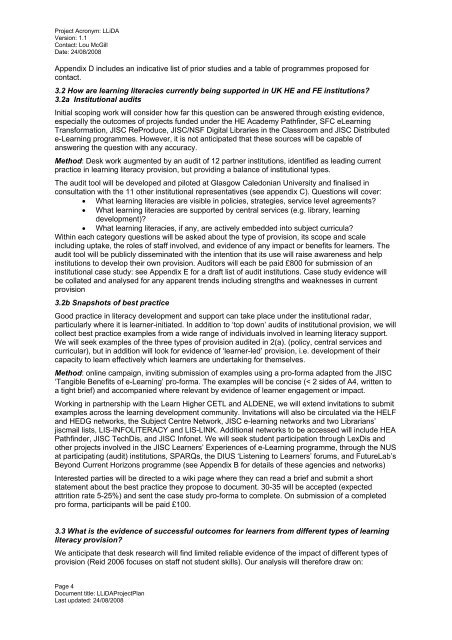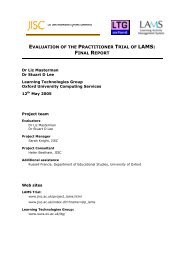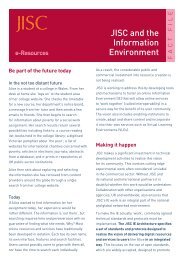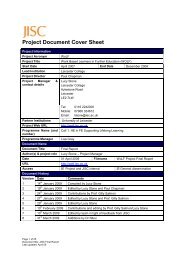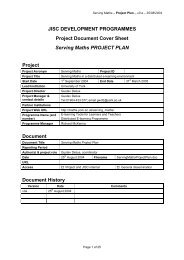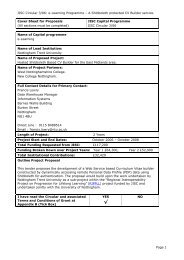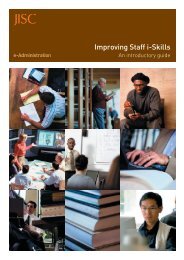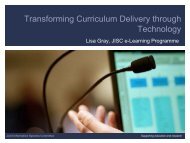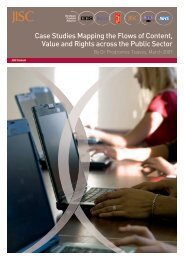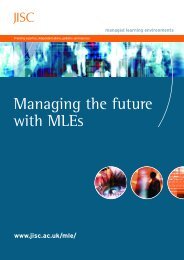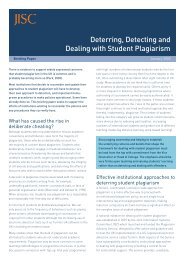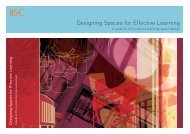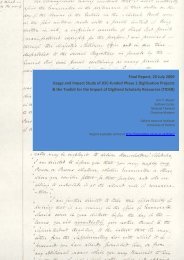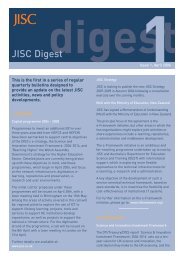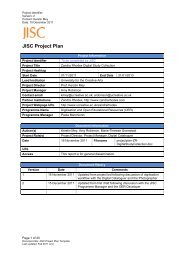LLiDA Project Plan - Jisc
LLiDA Project Plan - Jisc
LLiDA Project Plan - Jisc
You also want an ePaper? Increase the reach of your titles
YUMPU automatically turns print PDFs into web optimized ePapers that Google loves.
<strong>Project</strong> Acronym: <strong>LLiDA</strong><br />
Version: 1.1<br />
Contact: Lou McGill<br />
Date: 24/08/2008<br />
Appendix D includes an indicative list of prior studies and a table of programmes proposed for<br />
contact.<br />
3.2 How are learning literacies currently being supported in UK HE and FE institutions?<br />
3.2a Institutional audits<br />
Initial scoping work will consider how far this question can be answered through existing evidence,<br />
especially the outcomes of projects funded under the HE Academy Pathfinder, SFC eLearning<br />
Transformation, JISC ReProduce, JISC/NSF Digital Libraries in the Classroom and JISC Distributed<br />
e-Learning programmes. However, it is not anticipated that these sources will be capable of<br />
answering the question with any accuracy.<br />
Method: Desk work augmented by an audit of 12 partner institutions, identified as leading current<br />
practice in learning literacy provision, but providing a balance of institutional types.<br />
The audit tool will be developed and piloted at Glasgow Caledonian University and finalised in<br />
consultation with the 11 other institutional representatives (see appendix C). Questions will cover:<br />
• What learning literacies are visible in policies, strategies, service level agreements?<br />
• What learning literacies are supported by central services (e.g. library, learning<br />
development)?<br />
• What learning literacies, if any, are actively embedded into subject curricula?<br />
Within each category questions will be asked about the type of provision, its scope and scale<br />
including uptake, the roles of staff involved, and evidence of any impact or benefits for learners. The<br />
audit tool will be publicly disseminated with the intention that its use will raise awareness and help<br />
institutions to develop their own provision. Auditors will each be paid £800 for submission of an<br />
institutional case study: see Appendix E for a draft list of audit institutions. Case study evidence will<br />
be collated and analysed for any apparent trends including strengths and weaknesses in current<br />
provision<br />
3.2b Snapshots of best practice<br />
Good practice in literacy development and support can take place under the institutional radar,<br />
particularly where it is learner-initiated. In addition to ‘top down’ audits of institutional provision, we will<br />
collect best practice examples from a wide range of individuals involved in learning literacy support.<br />
We will seek examples of the three types of provision audited in 2(a). (policy, central services and<br />
curricular), but in addition will look for evidence of ‘learner-led’ provision, i.e. development of their<br />
capacity to learn effectively which learners are undertaking for themselves.<br />
Method: online campaign, inviting submission of examples using a pro-forma adapted from the JISC<br />
‘Tangible Benefits of e-Learning’ pro-forma. The examples will be concise (< 2 sides of A4, written to<br />
a tight brief) and accompanied where relevant by evidence of learner engagement or impact.<br />
Working in partnership with the Learn Higher CETL and ALDENE, we will extend invitations to submit<br />
examples across the learning development community. Invitations will also be circulated via the HELF<br />
and HEDG networks, the Subject Centre Network, JISC e-learning networks and two Librarians’<br />
jiscmail lists, LIS-INFOLITERACY and LIS-LINK. Additional networks to be accessed will include HEA<br />
Pathfinder, JISC TechDis, and JISC Infonet. We will seek student participation through LexDis and<br />
other projects involved in the JISC Learners’ Experiences of e-Learning programme, through the NUS<br />
at participating (audit) institutions, SPARQs, the DIUS ‘Listening to Learners’ forums, and FutureLab’s<br />
Beyond Current Horizons programme (see Appendix B for details of these agencies and networks)<br />
Interested parties will be directed to a wiki page where they can read a brief and submit a short<br />
statement about the best practice they propose to document. 30-35 will be accepted (expected<br />
attrition rate 5-25%) and sent the case study pro-forma to complete. On submission of a completed<br />
pro forma, participants will be paid £100.<br />
3.3 What is the evidence of successful outcomes for learners from different types of learning<br />
literacy provision?<br />
We anticipate that desk research will find limited reliable evidence of the impact of different types of<br />
provision (Reid 2006 focuses on staff not student skills). Our analysis will therefore draw on:<br />
Page 4<br />
Document title: <strong>LLiDA</strong><strong>Project</strong><strong>Plan</strong><br />
Last updated: 24/08/2008


